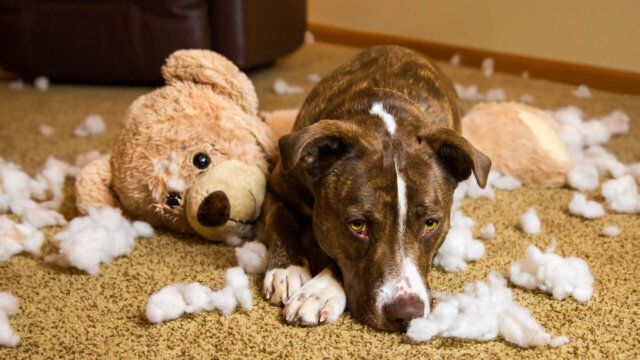iHeartDogs is reader-supported. When you buy via links on our site, we may earn an affiliate commission at no extra cost to you.
There is nothing like coming home to your sweet dog… until you see the destruction. Couches, shoes, garbage, and even wall molding can be a victim. Sometimes, dogs that suddenly destroy things when their families are away wind up at shelters. But that’s not fair at all. No one wants to keep replacing items their dogs have damaged. Yet, training is a part of having a dog that can’t be ignored. So, why does your dog destroy things? It could be for several reasons.
Training out established behaviors can be tough. SpiritDog can help you get real, lasting results using effective training methods. Check out SpiritDog’s Tackling Reactivity Bundle, which includes a mini-course on Separation Anxiety Solutions!
Reasons Dogs Suddenly Destroy Things
Remember, dogs can’t speak our language. They can’t tell you what’s going on through words, but a dog that is destroying things is leaving a clear message. You just have to figure out what that message is and then you can respond appropriately. In most cases, it’s about more than just getting your attention. Here are some of the main reasons dogs cause destruction when they’re alone.

Puppyhood
Puppies are notorious for chewing. Their teeth are coming in, falling out, and coming in again. All this causes a puppy to need to chew, just like a human baby. Some dog parents think, ‘fine, when they’re not a puppy, they will stop.’ Yet, if you allow the habit to form, your puppy will keep chewing on inappropriate items for the rest of their life.
Boredom
Dogs get bored! Regardless of breed, all dogs need exercise and mental stimulation. If you’re not providing enough of either, your dog will find something to do on their own. But you may not be happy with the results. Bored dogs are more likely to suddenly destroy things they shouldn’t.
Stress
Unfamiliar situations can cause stress for puppies and adult dogs. This could be a one-time situation like a dog walking by or something more serious like moving to a new home. Dogs don’t know how to handle themselves in stressful situations. So, they resort to chewing, digging, or scratching to calm their fears.

Separation Anxiety
This is the most extreme type of destructive behavior. Dogs with true separation anxiety will do some pretty intense things. I’ve heard of dogs jumping out windows and eating drywall when their loved ones leave.
Tips for Coping with a Destructive Dog
How you handle your dog’s destructive behavior depends on why they’re doing it in the first place. If you suspect your dog suffers from separation anxiety, you may need the help of a certified professional positive reinforcement dog trainer. They can help your dog overcome their fears and stop the destruction. For puppies and dogs suffering from boredom, you have some easier options.
More Exercise and Mental Stimulation
Both mental stimulation and exercise will help dogs be too tired to chew. Mental stimulation includes things like puzzle toys and training that makes your dog think. This can prevent your dog from suddenly destroying your belongings.
Appropriate Choices
Make sure your dog has access to appropriate toys that they can safely chew on. Praise them if you notice them deciding to chew on a toy rather than your couch. Then, when you’re gone, they will be more likely to make the right decision.

Visit the Vet
In rare cases, chewing could be related to health problems. Older dogs might gnaw on things if their mouths are in pain, much like when a puppy is teething. This could be a sign of gum disease, swollen gums, tartar build-ups, or infections. So, make sure you discuss the chewing problem with your vet.
Remove Access
Putting your dog in a crate if they are crate trained prevents them from making the wrong choice. It can save you the heartache of a mess when you get home and possibly save your dog from a trip to the vet for ingesting something they shouldn’t. Crates are great while you’re working on problem behaviors with your dog. However, make sure you never use their crate as a punishment.
Proofing
Finally, if you are going to leave your dog loose when home alone, proof your home. Put baby locks on cabinets you don’t want your dog to get into. Shut doors to rooms with things your dog may want to chew, such as shoes or kid’s toys. Put the TV remote out of reach or in a drawer. Taking a few minutes to check the room before you leave is definitely worth your time. Just don’t forget to leave some dog toys out!
Related: 10 Best Dog Doors
Try Online Training Courses!
Training doesn’t have to be a chore. Let SpiritDog help you make training time a fun, productive bonding experience between you and your best friend! Whether you want to work out bad habits or strengthen good canine manners, SpiritDog can help guide you!
SpiritDog’s courses are developed by real trainers who know that the best teacher for your dog is the person they love most in the world – you! Even if you’ve never trained before, you can get better behavior out of your pup with SpiritDog’s guidance. With so many happy pet parents who have used their courses, SpiritDog guarantees 100% satisfaction!
SpiritDog offers over 17 science-based courses, as well as 12 free bonus courses to get you and your pup bonding and building better behaviors. Their Tackling Reactivity Bundle can help you keep your pup safely by your side and help anxious or reactive pups keep calm. For new pet parents, the Ultimate Puppy Program can help you start your pup off on the right paw from the beginning. Those who want to teach their pets great behaviors at any age, check out their Ultimate Masterclass Bundle. Whatever you need, SpiritDog can help keep your dog safe, happy, and well-behaved!

 Toledo, United States.
Toledo, United States.